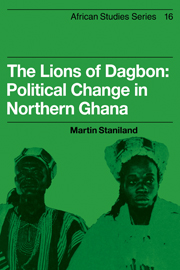Book contents
- Frontmatter
- Contents
- List of maps, figures, and tables
- Preface
- Abbreviations and glossary
- Map 1 Northern Ghana, 1965
- 1 The country and the people
- 2 Dagbon
- 3 Colonial rule, 1899–1930
- 4 Dagomba divided and united, 1899–1930
- 5 The battle of Watherston Road
- 6 Dagomba politics under indirect rule, 1932–1947
- 7 Votibu
- 8 Party politics
- 9 The Yendi tragedy
- 10 Conclusions
- Appendixes
- Notes
- Bibliography
- Index
10 - Conclusions
Published online by Cambridge University Press: 04 August 2010
- Frontmatter
- Contents
- List of maps, figures, and tables
- Preface
- Abbreviations and glossary
- Map 1 Northern Ghana, 1965
- 1 The country and the people
- 2 Dagbon
- 3 Colonial rule, 1899–1930
- 4 Dagomba divided and united, 1899–1930
- 5 The battle of Watherston Road
- 6 Dagomba politics under indirect rule, 1932–1947
- 7 Votibu
- 8 Party politics
- 9 The Yendi tragedy
- 10 Conclusions
- Appendixes
- Notes
- Bibliography
- Index
Summary
Insofar as the past has been transmitted as tradition, it possesses authority; insofar as authority presents itself historically, it becomes tradition.
Any study of social behaviour, if conducted with at least minimal realism, ends up facing certain irreducible ambiguities of individual behaviour. The exercise is, nevertheless, worth undertaking, because on the way we should acquire a clearer definition of the problems and choices before the participants and an enhanced ability to conceptualise other, comparable situations. This, as I understand it, is the justification of comparative politics; it is also the point of this book.
It remains, therefore, to extract from the preceding account an assessment which must include two elements: an assessment of the case itself and an assessment of its significance within the wider field of comparative studies. The first is the more delicate evaluation of the two, for it necessarily prompts questions of personal responsibility and judgement. These questions are especially pointed in the present case, for the reason that the denouement involved death or serious injury for over sixty men, women, and children. It would be as naive to conclude that this tragedy was the abstract responsibility of impersonal forces as it would be to suppose that it could be blamed on one or two individuals. An observer, certainly one having the privileged immunity – and inadequate knowledge – of an outsider in transit, should, nevertheless, not presume to allot responsibility. I have, in any case, tried to show that responsibility in the Yendi dispute is diffuse (though, again, not insignificant) and, in my view, it certainly extends further back in time than most participants seem to believe.
- Type
- Chapter
- Information
- The Lions of DagbonPolitical Change in Northern Ghana, pp. 169 - 176Publisher: Cambridge University PressPrint publication year: 1975

